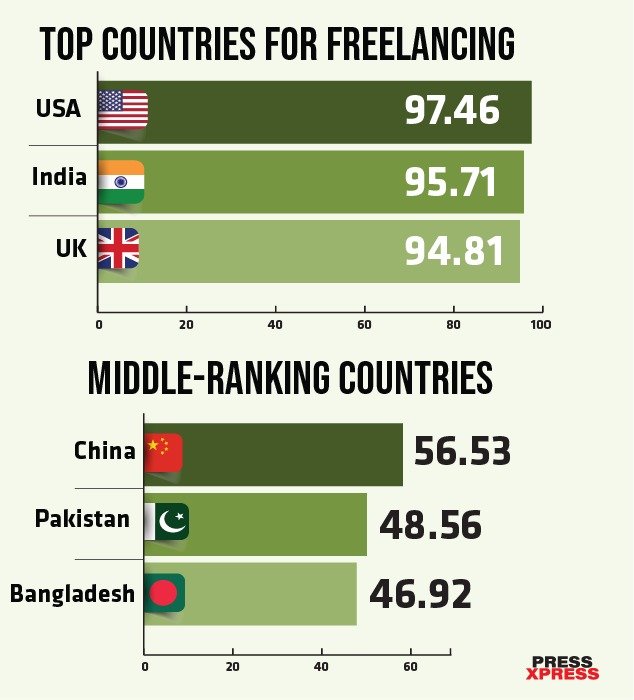In the latest unveiling of the ‘Best Countries for Hiring Freelancers 2024’ list by CEOWorld Magazine, Bangladesh finds itself in 29th spot among 30 nations. Once hailed as a premier outsourcing haven, the nation now grapples with the bitter reality of not even making it to the top 25 for freelancing and online outsourcing endeavors.
You can also read: Microfinance Leads Bangladesh’s Fight Against Poverty
It’s a staggering descent from grace for a country that once stood tall in the global freelancing landscape. With a score of 46.92, Bangladesh trails behind its regional counterparts, India and Pakistan, casting a shadow over its erstwhile glory. This revelation, echoed by both global and local media outlets, underscores the grim narrative of Bangladesh’s dwindling prominence in the freelance ecosystem.
Stagnation or Innovation? Bangladesh’s Freelancing Crossroads
Despite a burgeoning global community of 1.57 billion freelancers, Bangladesh struggles to carve a notable niche in this thriving market, estimated to be worth a staggering $3.39 billion. As freelancers worldwide rake in an average of $21 per hour, Bangladesh finds itself lagging behind, grappling with missed opportunities and untapped potential.
At the summit of this list, the heavyweight champions reign supreme. The USA, India, and the UK stand tall with scores that dwarf the competition, cementing their dominance in the freelancing arena. Meanwhile, China and Pakistan clinch middling ranks, leaving Bangladesh stranded in a sea of missed opportunities.
It’s a sobering reality check for a nation that once basked in the limelight of outsourcing success. Just over four and a half years ago, Bangladesh proudly claimed the title of the world’s second-largest outsourcing hub for online work, as heralded by a report from the Oxford Internet Institute. Yet, in a mere blink of an eye, this narrative has unraveled, with Bangladesh plummeting an alarming 27 steps down the global ladder.
According to experts in the field, Bangladesh finds itself in a perilous descent, trapped in a cycle of mundane data entry and simplistic graphic tasks, failing to adapt to the rapid evolution of the industry. This stagnation, they argue, is dragging the nation down, inch by inch, as it struggles to keep pace with the dynamic currents of change.
To break free from this suffocating predicament, a paradigm shift is imperative. Bangladesh must pivot towards upskilling its workforce, embracing new technologies, and diversifying its portfolio of services. This urgent call to action has resonated across influential bodies such as the Bangladesh Association of Software and Information Services (BASIS), and the Bangladesh Association of Contact Centre and Outsourcing (BACCO). It echoes from the hallowed halls of the Ministry of Telecommunication and Information Technology.
Adapting to Thrive in the Freelancing Era
In the eyes of the world, the rankings speak volumes. The CEOWorld Magazine’s report lays bare the stark reality: the United States reigns supreme with a commanding score of 97.46, while India claims the runner-up position with a formidable 95.71.
But even in this darkness, there is a glimmer of hope. The call to arms is clear: only through vigilance and adaptation can Bangladesh reclaim its position in the global market. The path to redemption lies in relentless innovation and nurturing a workforce skilled in the technologies of tomorrow. Achieving the government’s ambitious goal of $5 billion in export revenue through outsourcing depends on these efforts.
But even in this darkness, there is a glimmer of hope. The call to arms is clear: only through vigilance and adaptation can Bangladesh reclaim its position in the global market.
The path to redemption lies in relentless innovation and nurturing a workforce skilled in the technologies of tomorrow. Achieving the government’s ambitious goal of $5 billion in export revenue through outsourcing depends on these efforts.
Experts highlighted a crucial issue in Bangladesh’s path: a failure to keep up with the rapid pace of technology.

They stressed that the nation’s reliance on outdated services, vulnerable to automation by AI or RPA, has led to a gradual decline in demand. their urgency was palpable as he cautioned against further decline if Bangladesh’s workforce fails to embrace cutting-edge technologies.
The experts painted a picture of a future where analytical skills and decision-making abilities would be highly valued, contrasting with the diminishing importance of basic tasks like data entry.
The Hidden Gem of Outsourcing Solutions
A World Bank report reveals a staggering statistic: nearly half of the global workforce now embraces freelancing. From the lively streets of New York to the vibrant markets of Mumbai, talented professionals are redefining the traditional employment landscape, drawn by the allure of financial rewards and unparalleled job satisfaction.
In the United States alone, freelancers added an impressive $100 million to their earnings last year, culminating in a staggering $1.3 trillion in total revenue. Notably, a significant portion of freelancers—nearly 70% —are under the age of 35, underscoring the dynamic nature of this workforce.
What sets Bangladesh apart in this landscape is its competitive pricing without compromising on quality. Compared to outsourcing giants like India, Poland, Sri Lanka, and the Philippines, Bangladesh offers a remarkable 40% lower price tag while delivering equivalent service and product quality.
Concerns about sacrificing quality for affordability are unwarranted; our IT companies pride themselves on timely delivery and adherence to client specifications.
For startup software companies operating on limited budgets, outsourcing to Bangladesh emerges as a strategic imperative. Here, they can leverage top-notch services tailored to their specific requirements, all within budget constraints.

A Testament to Talent and Tenacity
According to the Bangladesh Association of Software and Information Services (BASIS), over 100,000 Bangladeshi freelancers are making their mark globally. Currently, more than 70,000 IT professionals are engaged in approximately 1,500 software development firms within various IT industries. Their expertise is recognized both domestically and internationally.
Major international IT companies, including Accenture and IBM, have established offshore development centers in Bangladesh. The country’s software industry dates back to the 1980s, and the volume of offshore software projects has doubled in recent years. With over 100 universities and 1,400 colleges producing around 15,000 IT graduates annually, many equipped with professional certifications from leading vendors such as Microsoft, Cisco, Juniper, Oracle, and more, Bangladesh is meeting global competence standards.
Bangladesh’s achievements in the IT sector are widely recognized. The European Commission has identified Bangladesh as an ideal outsourcing destination. Denmark’s Ambassador Einer H Jensen noted, “Bangladesh has had a good start in recent times and is a preferred destination for outsourcing IT services.”


